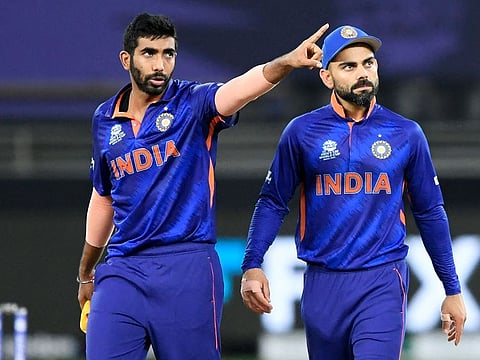ICC T20 World Cup: Did fear of failure, fatigue push India to the brink?
It’s far-fetched to see the all the permutations falling in place for Virat Kohli’s men

Dubai: The Indian cricket fans will be waking up with a day-after feeling after a humiliating loss to New Zealand in their Super-12 match of ICC T20 World Cup here on Sunday. The spectre of their campaign finishing in the league stages is now very much a reality - and to be honest - it’s difficult to see all the permutations and combinations falling into place to make for Virat Kohli’s men scrambling into the top four.
There is almost a paradox in India’s performance in the short history of the World Cup in this format. Ever since their win in the inaugural edition in 2007, India had subsequently become the hub of the T20 game’s economy with the Indian Premier League (IPL) booming there, but they have not been able to win the trophy yet again in the next five editions. It won’t be surprising if any sports analyst is tempted to draw a parallel with the IPL and Premier League football in England - which now attracts the best of global talents but has not yielded any major trophy to the national team.
In the build-up to the event getting under way in the UAE, India were rightfully considered as one of the favourites. If the reputation of so many matchwinners in the team was one, the other one was their acclimatisation to the conditions for more than a month - thanks to the IPL. The addition of Mahendra Singh Dhoni as the mentor of the team also seemed a constructive move, with talk of him bringing about a calming influence in the dressing room as well as the fact he was fresh out of a successful campaign in the IPL and would have a ground knowledge of the conditions like the back of his palm.
However, what one did not bargain for were neither the fatigue nor the fear factor - both of which have come in the way of India’s campaign taking off at all so far. The Indian cricketers - and their administration - had always prided themselves on being able to soak the pressure, thanks to their experience of coming through the choking pressure of expectations (be it at the international or franchise levels), but it seems that the fear of failing against the Kiwis again in a key ICC game bogged down the players.
If the batsmen displayed a kind of fear factor - caught between the dilemma of building the innings and launching a counterattack, the team management was also a party to subscribing to the theory when they took the decision of shielding Rohit Sharma against Trent Boult - with the thought of Shaheen Afridi’s inswinging yorker catching the Hitman in front of the wicket in the Pakistan game.
One understands if Rohit and Ishan Kishan had come out as openers with an eye on the right-left combination, but to field an untested combination in such a crunch game as openers and expect them to fire in the powerplay against a quality new ball attack was a bit too much. It betrayed nothing but overthinking on India’s part - something which could have been easily avoided.
The issue of fatigue came up on both the post-match conferences of India after the losses - first Virat Kohli admitting that a week’s break before the second game was welcome after the ‘high octane’ IPL while Jasprit Bumrah also spoke about bubble fatigue after the New Zealand game. The logic is an extremely credible one - given the fact that Indians were the only players who were on the road since June and the pressure is now telling on them when it mattered the most.
The question is: would these issues have up if India had won both the games? In both England and Australia camps, key players like Jos Buttler, Chris Woakes or Pat Cummins had taken breaks with an eye towards this World Cup or the Ashes campaign but it’s unrealistic to think about any top Indian player doing the same.
There are more questions, than answers, as of now for the Indian cricket team.
Afghanistan: The team India might be forced to cheer
In a tournament where teams are opting to field upon winning the toss, Afghanistan have chosen to bat first twice already despite conventional wisdom suggesting otherwise. It has paid them off well with the Afghans sitting on a run rate of +3.097- highest in Group 2.
Thus, for India to qualify, they would hope against hope that Afghanistan win against New Zealand and India themselves win first against them before that on November 3- the date for their next match.
India now need to: 1) Win their remaining three matches versus Afghanistan, Scotland, and Namibia and 2) Hope Afghanistan beat New Zealand and end up with a run rate worse than India.
Sign up for the Daily Briefing
Get the latest news and updates straight to your inbox









